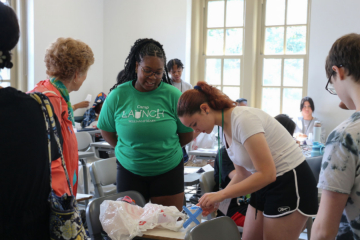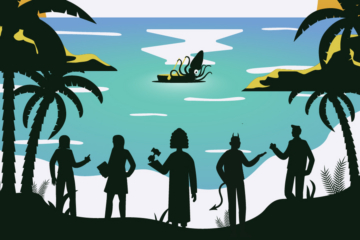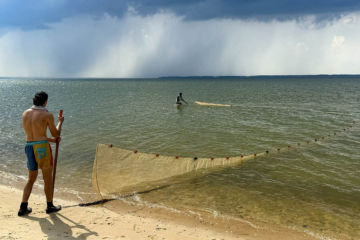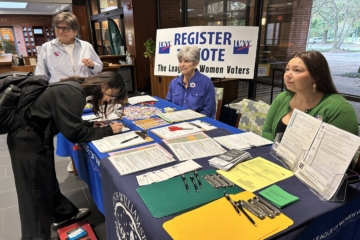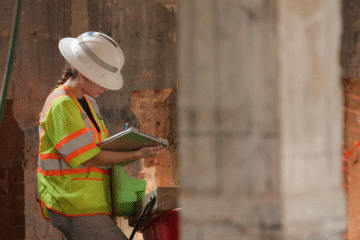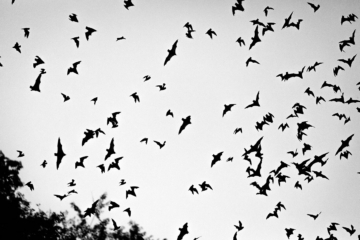Toward ‘a more perfect union’
The following is an excerpt from a W&M Alumni Magazine story that ran in the fall 2024 issue. Read the full article on the magazine’s website. – Ed.
With the population in the United States sharply divided on political issues, trust in our society’s institutions declining and disinformation spreading like wildfire, William & Mary has renewed its commitment to practicing and promoting the ideals on which the nation was founded.
As America’s first university, William & Mary played a crucial role in shaping our representative democracy and making it the internationally admired “shining city on a hill.” Today, W&M is a beacon of light in a gathering storm. It is a place where students develop the critical thinking and civil discourse skills they will need to uphold our democracy as leaders of our cities, states and nation. Through the Democracy Initiative in the university’s Vision 2026 strategic plan, William & Mary is modeling how to study, teach and illuminate the rights and obligations of 21st-century citizenship.

The university that educated the nation’s founders and early leaders is uniquely suited to bring people together, ask questions and explore answers, says former Federal Communications Commission Chairman Michael K. Powell ’85, D.P.S. ’02, who has served as rector of William & Mary’s Board of Visitors and chairman of the W&M Foundation.
“The founders were committed to scholarship around what an educated citizenry involves,” he says. “As the Alma Mater of the Nation, we should be immersed in and vocal about the ideas that they wrestled with, which were the foundations of democracy, and there should be no place better equipped to talk about those ideas and how to restore them.”
Making history
Thomas Jefferson came to William & Mary in 1760 as a 16-year-old, a typical age for students at the time. In his earliest surviving letter, he sought permission from a guardian to attend the university, saying he was eager to spend time studying away from his hometown friends and meet new peers. Later in life, the third U.S. president credited his education with saving him from a “worthless” society of horse racers, card players and fox hunters.
Jefferson’s education at William & Mary, influenced by concepts of reason and individual liberty, provided the foundation for him to help lead Colonial resistance to British rule and develop the legal framework for religious freedom and representative government.
As described in the book “Thomas Jefferson’s Education” by Alan Taylor, Jefferson saw education as hope for the future, and he wanted to broaden access to it. He believed that better educated leaders in the next generation would move reform efforts forward.
A key mentor for Jefferson at William & Mary was Scottish professor William Small, who encouraged an appreciation for Enlightenment thinkers such as English philosopher and physician John Locke and taught using the Socratic method of questioning students about their study material. Small, for whom Small Hall is named, introduced Jefferson to prominent attorney, legislator and judge George Wythe, who would become another important mentor and friend.
After two years at William & Mary, Jefferson studied law under Wythe from 1762 until 1767. Both men served as delegates to the Second Continental Congress in 1776 after the start of the Revolutionary War. Wythe was among the signers of the Declaration of Independence, which Jefferson drafted, and Wythe served as a delegate from Virginia to the Constitutional Convention in 1787.

When Jefferson became governor of Virginia and a member of the W&M Board of Visitors in 1779, he persuaded the board to create a professorship of law and police. The board named Wythe to that position, establishing the nation’s first law school and making William & Mary the first university in the nation. Among Wythe’s students were future U.S. Supreme Court Justices John Marshall and Bushrod Washington, three Virginia Supreme Court justices, and numerous congressmen and senators.
Both Jefferson and Wythe were inspired by Locke’s ideas of religious tolerance, government by the consent of the governed and natural rights of life, liberty and property. Jefferson drew on those when drafting the Declaration of Independence and later the Virginia Statute for Religious Freedom, a prototype for First Amendment protections in the U.S. Constitution.
“In the Enlightenment, there was the belief that the world could be made better,” says Julie Richter M.A. ’85, M.A. ’89, Ph.D. ’92, director of the National Institute of American History & Democracy (NIAHD), a partnership between William & Mary and The Colonial Williamsburg Foundation, and affiliate faculty member in W&M’s Harrison Ruffin Tyler Department of History. “There’s also the belief that it’s essential to expand rights.”
But not everyone benefited from the expansion of rights. The new system of government established by the U.S. Constitution did not end slavery, and voting remained limited to white, male property owners.
Taylor, a former postdoctoral fellow at the Omohundro Institute of Early American History and Culture and author of “Thomas Jefferson’s Education,” says that rather than a true democracy, the nation’s founders favored a republic where people were more indirectly represented. In part, that was because wealthy landowners who depended on enslaved labor did not want to lose power to the more sizable population who had little property. Currently the Thomas Jefferson Foundation Professor of History at the University of Virginia — founded by Jefferson in 1819 — Taylor spoke at William & Mary on Oct. 26 as part of the For 2026 conference, “Virginia’s Revolutionary Histories & Beyond.”
As the new nation fought for freedom from British rule, Jefferson and Wythe reviewed Virginia’s Colonial laws and redrafted them. Among the 126 measures they presented to the General Assembly was a bill Jefferson proposed to fund a public school system. Legislators rejected the measure, however, preferring to keep taxes low.
Jefferson’s vision for education reform included proposals that William & Mary adopted in 1779. At his urging, the board abolished its divinity school and created new professorships in modern languages, anatomy and medicine, and law and government, and expanded the curriculum to include natural history and the fine arts. In 1782, Jefferson’s alma mater conferred on him the honorary degree of Doctor of Civil Law.
Learning from the past
Today, William & Mary provides opportunities for current and prospective students to walk in the Founding Fathers’ footsteps and study early American history from all angles. The university is also expanding the knowledge of that history through research and community partnerships.
These efforts support one of the Democracy initiative’s goals: “As we prepare for our country’s 250th anniversary, W&M will ensure that our nation’s origin stories are expansive, honest and that they unite us in a commitment to knowledge as a public good.”

Among the most visible partnerships is one with The Colonial Williamsburg Foundation to restore and research the Williamsburg Bray School, attended by enslaved and free Black children on William & Mary’s campus between 1760 and 1774. Current W&M students are assisting with archival research about the Bray School that has been taking place along with genealogical studies and oral histories of families connected to the school. A formal reopening of the surviving building, relocated in 2023 to Colonial Williamsburg’s Historic Area, took place Nov. 1, with speakers and activities reflecting on the school’s legacy.
Both the Bray School and the Brafferton Indian School for Native American children were operating at William & Mary during Jefferson’s time at the university. In recognition of this juxtaposition, W&M’s Strategic Cultural Partnerships office is planning lectures, courses and other events in 2026 under the theme “Education in Jefferson’s Virginia,” in collaboration with the Omohundro Institute, the W&M Bray School Lab and other partners.
“One of the Vision 2026 goals is to make sure that this nation’s origin story becomes every American’s shared story,” says Ann Marie Stock, presidential liaison for Strategic Cultural Partnerships, and Chancellor Professor of Modern Languages & Literatures.

Better arguments
While gaining a deeper understanding of history and our system of government, William & Mary students are encouraged in their classes and campus programs to explore ideas, ask questions and engage in respectful dialogue.
“The role of a university is to facilitate free and open ideas in pursuit of knowledge and truth,” Dean A. Benjamin Spencer told the new class at William & Mary Law School last fall. “You are here to have your thinking challenged, not simply affirmed, and you’re here to develop the mental muscles necessary for the civil discourse that enables our free society to continue to prosper and progress.”
To emphasize the importance of free speech in the educational experience at William & Mary, a recording of Spencer’s remarks has been shared with incoming undergraduate students, faculty, staff and leadership boards at William & Mary as part of the Vision 2026 Democracy initiative, co-chaired by Senior Vice President for Student Affairs & Public Safety Ginger Ambler ’88, Ph.D. ’06, P ’24 and Dean of University Libraries Carrie Cooper Ed.D. ’24.
“The future of democracy depends on active citizens who understand its ideals,” Ambler says. “Those skills are taught and practiced here.”
First-year students have been introduced to the nonprofit Aspen Institute’s Better Arguments Project during orientation since 2021. The framework uses five principles for having better arguments: Take winning off the table, prioritize relationships and listen passionately, pay attention to context, embrace vulnerability and make room to transform. The W&M program is unique for a higher education environment, Ambler says.
“Better Arguments is a useful framework for our students and our workforce as we aim to build confidence and comfort in the act of engaging with people who have different opinions,” Cooper says.
In May, Ambler and Cooper led a session on Engaging Across Difference at the W&M Washington Center for students, faculty, staff and alumni.
Mark Strand ’26, one of about 50 participants, said the group’s fairly compact size and its diversity in age and backgrounds allowed for a lively and open discussion on questions such as whether hate speech should be allowed on the internet. Members of the group moved into one of four corners based on their initial responses, then talked about how they came to hold their views.
“Immediately I thought, ‘Hate speech shouldn’t be allowed on the internet. I’ll go to the corner for disagree or strongly disagree,’” says Strand, a public policy major, music minor and Authentic Leadership Institute fellow. “And then I heard a lot of compelling ideas about what it means to allow free speech and how we allow people to express themselves.”
He was able to apply some of the Engaging Across Difference tools during his summer internship with the National Association of Regional Councils, an urban planning organization. When writing newsletters about policy briefings, for example, “we would discuss what topics to write about and how to explain an issue in a bipartisan way.”

Fellow participant Amanda Azia ’26 says that giving students a chance to practice talking about contentious subjects will be helpful in their careers and personal lives.
“It’s important to be able to articulate the thoughts that you have,” says Azia, a government major and Authentic Leadership Institute fellow who plans to attend law school. “On the other hand, you could learn a new piece of information, and when you become better educated and better informed, maybe you would change your opinion on something.”
Leading up to the presidential election this fall, William & Mary held professional development sessions for all employees on the Engaging Across Difference framework.
The professional development sessions were followed by facilitated workshops where participants were able to practice using the framework in smaller groups.
The practice of democracy is part of William & Mary’s DNA, Ambler says. “We have the first student-run honor system in the nation. It’s one of the things we’re most proud of — putting into practice what it means to live in a system where we see ourselves each as being responsible for stewarding the culture of honor.”
Self-determination in William & Mary’s residence halls has been a guiding philosophy for over 50 years, she adds. “In many ways living-learning laboratories for democracy, our residence halls are a model of representative student self-governance.”
Teaching democracy
Dawn Edmiston Ed.D. ’20, a marketing professor at W&M’s Raymond A. Mason School of Business, says she was impressed by the simplicity and power of the Engaging Across Difference concepts after attending the Washington Center event. She applied them later in Dublin and Northern Ireland while leading the Global Business Minor program, developed in partnership with the Reves Center for International Studies.
“I introduced the Better Arguments principles so students could practice concepts such as giving attention to context and embracing vulnerability to transform their thinking about the world around them,” says Edmiston, who serves on the Washington Center’s Academic Advisory Council.
In Northern Ireland, for example, students grappled with questions about religious and political division, both there and in the United States, as well as economic conflict related to the United Kingdom’s withdrawal from the European Union.
“Students interviewed locals within the Irish marketplace to get a better appreciation of their needs and their perspectives,” Edmiston says. “Then, the final course in the program was about understanding culture and how to be more effective in environments that are diverse, and what management principles you can use to help facilitate change.”
John J. McGlennon, Class of 1935 Professor in William & Mary’s government department, says that one of the responsibilities that comes with the freedom of being a citizen in the United States is to be well informed about how the political system functions.
“One of the things that we try to impart to students is an understanding of how things get done and how effective legislating can make a difference in the lives of Americans,” he says. “But there’s another part of that freedom, which is the responsibility to listen to other perspectives and to critically evaluate sources of information.”

Margaret Hu, the Taylor Reveley Research Professor and Professor of Law, and founding director of the Digital Democracy Lab at W&M Law School, teaches a course called “Data and Democracy” that she originally developed while at Duke University in response to allegations of foreign interference, cyberattacks and social media disinformation during the 2016 election.
“Then the 2020 election and the events of Jan. 6, 2021, increased calls to better understand the fraying of the rule of law and faith in our democratic institutions, including our electoral systems,” she says. Hu first taught the course at William & Mary last fall, and she’s teaching it again this fall.
She talks about her research in an episode of William & Mary’s “Democracy Initiative Podcast” titled “Democracy X Technology,” along with Elizabeth Losh, the Duane A. and Virginia S. Dittman Professor of English & American Studies, and Jaime Settle, the Cornelia Brackenridge Talbot Professor of Government.
Students in Hu’s “Data and Democracy” class and the Digital Democracy Lab investigate how artificial intelligence, deceptive images known as “deepfakes” and the calibrating of algorithms are exacerbating social tension and how they are being used by foreign adversaries to exploit Americans’ faith in the Constitution and the rule of law. Such leaders are seeking to increase their global position through information warfare, she says.
Americans are not alone in facing challenges to democracy, says John Gilmour, a professor of government and public policy at William & Mary. He spent six weeks in Prague over the summer directing a study abroad program in which he taught a course called “Populism in the United States and Central Europe.”
“Some of the focus was on Poland and Hungary, where populist leaders have taken control and acted in various ways to limit democracy,” Gilmour says, such as curbing judicial independence and freedom of the press, and implementing voting measures that make it easier for them to remain in power.
“One of the characteristics of populist leaders is that they believe that they represent the people, and they don’t believe that institutions and rules should get in their way,” he says.
At William & Mary, Gilmour teaches a course on presidential power that covers contentious topics such as the Jan. 6, 2021, riot at the U.S. Capitol. Despite wide-ranging perspectives among his students, discussion in his classes has been civil and respectful, he says.
“Students in government classes and public policy classes leave with a really good understanding of how the government works and how they might be able to have a part in it,” Gilmour says.
As a result, he says, there are many William & Mary graduates working in Washington and Richmond, putting to use what they learned.
“One of the values of institutions in a democracy is that they can stand up against tyrants,” Gilmour says. “They make it harder for people to break the law and get away with illegal actions. Democracy depends on people working in institutions and upholding democratic norms through those institutions.”
Read the rest of the story on the W&M Alumni Magazine website.
Latest W&M News
- W&M’s Center for Gifted Education expands pre-collegiate summer campsOfferings strengthen access and year-round support for Virginia students.
- Raft Debate 2025: Who will keep their spot on the raft?The beloved W&M tradition returns Oct. 28 starting at 6 p.m. in the Sadler Center’s Commonwealth Auditorium.
- An average year for juvenile striped bass in Virginia waters in 2025Preliminary results from an ongoing long-term survey suggest that an average year class of young-of-year striped bass was produced in the Virginia tributaries of the Chesapeake Bay in 2025.
- Helping students fulfill their civic dutyAs part of its commitment to democracy, W&M is dedicated to helping students, faculty and staff participate in elections.
- Uncovering layers of historyAs part of the team uncovering the foundations of the historic Williamsburg Bray School, Heather Little M.A. ’23 and Madeline Dorton ’24 are unearthing the history of the campus where they studied history and archaeology as students.
- Harnessing the sun to help the nightGraduate student Bryce Donaghue M.S. ’26 studies solar farms as potential habitats for bats.








